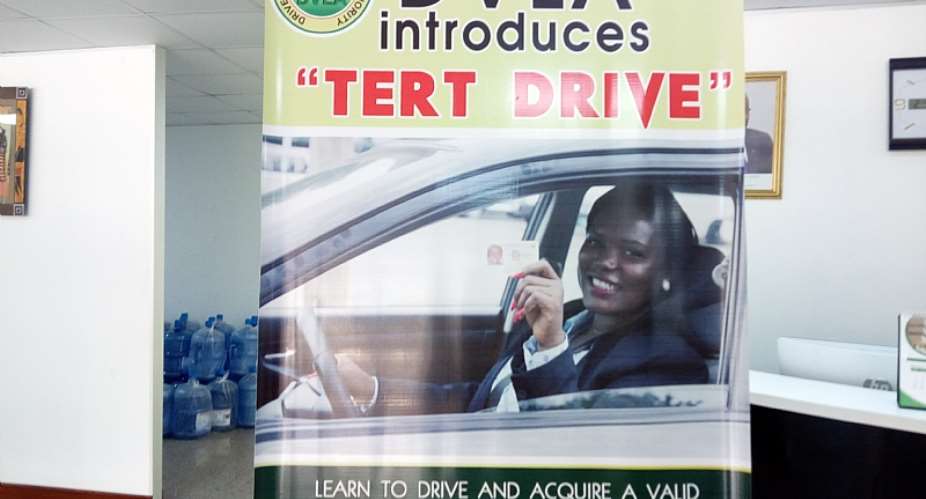The Driver and Vehicle Licensing Authority (DVLA) had introduced the Tertiary Drive also known as Tert Drive to afford tertiary students the opportunity to learn how to drive while in school.
The project which was first launched at the University of Professional Studies (UPSA) in Accra last year has caught up with other institutions such as the Regional Maritime University, Pentecost and UPSA.
However, proposal on the project has been sent to other tertiary institutions such as the University of Ghana, Central University College and the Ghana Institute of Journalism (GIJ), among others.
Francis Asamoah Tuffour, the Public Relations Officer of DVLA, said the product will respond to the growing need of tertiary students hoping to acquire a genuine driver’s licence before the completion of their respective academic and professional studies.
He noted that the idea is to ensure that students graduate with their certificates alongside a genuine driving licence acquired in a hassle-free environment.
Mr. Tuffour added that the Tert Drive which has been specially designed for students in tertiary institutions as a means of adding value to their academic and professional qualifications, is affordable, convenient, has a flexible payment plan and is estimated to benefit 150,000 students annually.
According to him, all processes leading to the acquisition of a driving license, such as training, testing, personalisation and issuance of license will be done on campus.
He intimated that the move forms part of the country’s National Road Safety Strategy of improving road safety management, ensuring safer mobility, safer vehicles and safer road-users.
“As part of the initiative, tertiary institutions are allowed to establish their own driving schools, with the approval of DVLA, or work with DVLA-approved driving schools. The DVLA will support institutions that’s will take advantage of this product to use their institutions for training. Participating institutions would be required to provide classroom for the theory aspect of the training and a dedicated place for its practical training,” he stated.
Mr. Tuffour posited that the concept offers a complete solution to the acquisition of a genuine driver’s licence and prevent the tendency where applicant fall victim to the activities of “Goro operatives”.
“Many people, including students, have fallen victim to the activities of unscrupulous middle men (goro boys and girls) who exploit these innocent people thereby enriching themselves,” he stressed.
The move, he said, among others, will give students added advantage over other competitors who are equally qualified but have no driving skills or driver’s licence and improve the chances of those with licence to grab the job(s).
According to him, this could best be described, as cutting-edge-approach, which is; acquiring educational qualification and a driver’s licence readily within the same period.
What are the requirements?
Mr. Tuffour explained that to enrol on the programme, a student must be 18years and above, physically and mentally fit to drive, provide an admission letter, a valid national identification card, including a passport, and a resident permit (in the case of foreign students).
He emphasised that students will pay the exact statutory amount the public pays, which now stands at GH₵ 240, to get their drivers’ licence. They will, however’ enjoy some discount on the GH₵ 600 which is now paid at some driving schools.
The PR Officer stated that the Driver and Vehicle Licensing Authority (DVLA) remains a force to reckon with as a public organisation under Ministry of transport to promote good driving standards and ensure road worthiness.
He indicated that the Authority’s focus is to ensure best practices for licensing drivers and vehicles to promote road safety and environmental sustainability, while pursuing integrity, excellence, professionalism and reliability in service delivery.
“Its vision is to become a reputable organisation with internationally accepted standards for driver and vehicle licensing,” Mr. Tuffour stated.
Established in 1999 by an Act of Parliament (Act 569), he said the Authority has gone a step further in its schemes of operation by introducing a number of initiatives including state-of-the-art equipment to facilitate the printing of driver’s licenses, state of the art data and customer centres among others.





 Meta releases new version of conversational AI across its platforms
Meta releases new version of conversational AI across its platforms
 Cape Town named Africa’s Best Airport 2024 by Skytrax
Cape Town named Africa’s Best Airport 2024 by Skytrax
 Bono East: Four injured after hearse transporting corpse crashes into a truck
Bono East: Four injured after hearse transporting corpse crashes into a truck
 ‘Be courageous, find your voice to defend our democracy’ — Sam Jonah urges journ...
‘Be courageous, find your voice to defend our democracy’ — Sam Jonah urges journ...
 Exodus of doctors, nurses and teachers have worsened because of unserious Akufo-...
Exodus of doctors, nurses and teachers have worsened because of unserious Akufo-...
 2024 election: Avoid insults, cutting down people in search of power – National ...
2024 election: Avoid insults, cutting down people in search of power – National ...
 ‘You passed through the back door but congratulations’ — Atubiga on Prof Jane Na...
‘You passed through the back door but congratulations’ — Atubiga on Prof Jane Na...
 Government’s $21.1 billion added to the stock of public debt has been spent judi...
Government’s $21.1 billion added to the stock of public debt has been spent judi...
 Akufo-Addo will soon relocate Mahama’s Ridge Hospital to Kumasi for recommission...
Akufo-Addo will soon relocate Mahama’s Ridge Hospital to Kumasi for recommission...
 We must not compromise on our defence of national interest; this is the time to ...
We must not compromise on our defence of national interest; this is the time to ...
